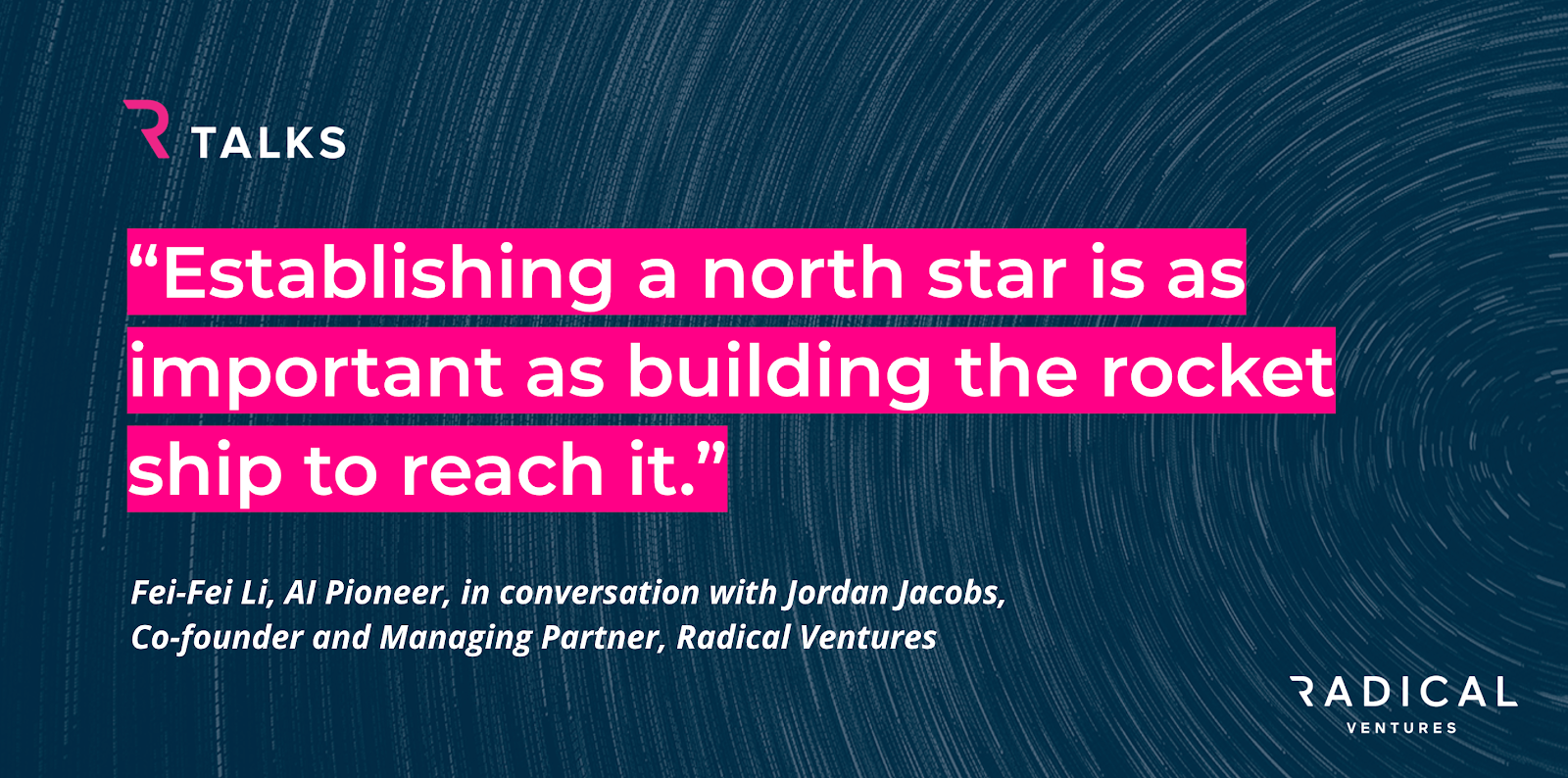While the history of artificial intelligence and its profound impact on society is still being written, a watershed moment from the 2012 ImageNet competition has staked a firm claim on the opening chapters of modern AI’s rise to prominence. ImageNet was the brainchild of Stanford Computer Science Professor Fei-Fei Li. Fifteen years ago, Li built a dataset of millions of labeled images which evolved into an annual competition to see which algorithms could identify objects with the lowest error rate. In the latest episode of the Radical Talks podcast, Li recounts the announcement of the 2012 ImageNet winner, when a University of Toronto team, led by Professor Geoffrey Hinton, used a deep learning model to deliver groundbreaking results that would change the course of computer vision and pave the way for a Cambrian Explosion of AI innovation and application building.
Today, Fei-Fei Li is widely regarded as a pioneer in the field of AI and computer vision. As WIRED magazine puts it, Li is “one of a tiny group of scientists—a group perhaps small enough to fit around a kitchen table—who are responsible for AI’s recent remarkable advances.” Building on those earliest breakthroughs, Li’s work now focuses on how AI will revolutionize the healthcare industry. In particular, she’s exploring how the application of ambient intelligence from sensors will provide doctors and caregivers with clinical insights that may change the nature of how healthcare is delivered. Li is a co-founder of Dawnlight, a Radical portfolio company building technologies in this space.
In this episode of Radical Talks, Li also discusses how we should be thinking about the human values of AI systems and why the diversity within today’s AI research community needs to evolve alongside the technology. It is a timely discussion with an AI luminary who has helped shape the course of modern AI innovation. We hope you enjoy the conversation as much as we did.
Subscribe to Radical Talks wherever you listen to podcasts.
AI News This Week
-
Vector Institute Releases First Annual Ontario AI Snapshot (Vector Institute)
Among its highlights, the report indicates that Ontario’s AI ecosystem is well-positioned for resilience and growth: over 1,000 master’s students enrolled in AI programs across the province, nearly 20,000 AI jobs were created and retained, millions of dollars were invested in AI R&D, VC investment in AI totalled $1.9 billion, and in a survey of businesses, half reported commercializing AI technologies. The Vector Institute also continues its expansive growth. Founded four years ago by co-founders who include Radical Managing Partner Jordan Jacobs, Radical co-founder Tomi Poutanen, Geoffrey Hinton, and Radical partner and Vector chair Ed Clark, the research centre has grown from a few founding faculty to over 500 researchers.
-
The true cost of building a machine learning team in Toronto (Radical Ventures)
In this issue of Radical Scale, our Director of Talent, Meg Lizza, breaks down the true cost of building a ML team for AI startups in Toronto. “Understanding what it costs to recruit the best talent from day one will maximize your company’s ROI and save time and money in the long run.” Radical Scale is a regular feature exploring key strategies for growing early stage technology companies.
-
The Most Important Voice in Artificial Intelligence: Frontline Workers (Forbes)
When it comes to artificial intelligence’s impact on the future of work, James Manyika, Chairman of the McKinsey Global Institute, suggests AI is more likely to change jobs than replace them. However, as technology takes on tasks that are better suited to automation, more consideration will need to be given to upskilling workers who will be on the front lines of interacting with AI systems. The challenge for organizations is to provide the knowledge and training to prepare for this new age.
-
These Doctors Are Using AI to Screen for Breast Cancer (WIRED)
Many people were skipping regular checkups and scans last year due to worries about COVID-19. In response, the Massachusetts General Hospital began using an artificial intelligence algorithm to predict who is at most risk of developing cancer. The AI-powered approach helped identify a number of women who, when persuaded to come in for routine screening, turned out to have early signs of cancer. Where previous statistical techniques were no better than random, women flagged by the algorithm were three times as likely to develop cancer.
-
The Biden administration’s AI plans: what we might expect (MIT Technology Review)
Signals are emerging from the new administration on how it is thinking about artificial intelligence and technology. President Biden has already elevated the Director of the Office of Science and Technology Policy to a cabinet-level position. During his Senate confirmation hearing, Biden’s new Secretary of State, Antony Blinken, remarked that there is “an increasing divide between techno democracies and techno autocracies.” The new administration may look to new export controls on sensitive AI technologies and, given the reliance on Chinese suppliers for chip manufacturing, we may also see investments in domestic high-tech manufacturing capabilities.
Radical Reads is edited by Ebin Tomy.

